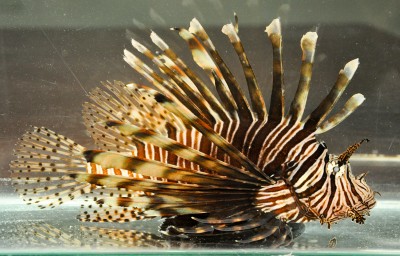NSU Newsroom
SharkBytes
Horizons
This version of NSU News has been archived as of February 28, 2019. To search through archived articles, visit nova.edu/search. To access the new version of NSU News, visit news.nova.edu.
This version of SharkBytes has been archived as of February 28, 2019. To search through archived articles, visit nova.edu/search. To access the new version of SharkBytes, visit sharkbytes.nova.edu.
Spread of Lionfish Posses Serious Potential Threat to Reef Fisheries
As the old saying goes: “You can’t put the genie back in the bottle.” Nowhere is this more evident than with the spread of lionfish, an invasive, non-native species that is threatening the marine ecosystems across the Gulf of Mexico, Caribbean and Atlantic Ocean. And one researcher at Nova Southeastern University (NSU) continues working to learn as much about lionfish as he can.
Dr. Matthew Johnston’s latest research, which has been published by the journal Coral Reefs, further explores the spread of lionfish and how their large numbers may impact the “economically important” reef fishes.
You can read the full press release about Dr. Johnston’s study ONLINE. Also enclosed is are a few photos of lionfish for use with your story (photo credit: Florida Fish and Wildlife Conservation Commission [FWC].)
